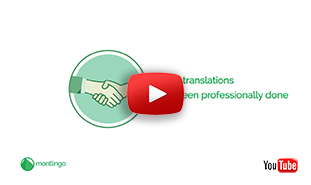THE MOST FREQUENTLY ASKED QUESTIONS ANSWERED
It’s normal to have questions about service providers, the services they provide and how they go about performing and charging for those services.
How long have you been in business?
They say you’re only as old as you feel. Considering MontLingo’s cumulative experience of it’s team, MontLingo is an old soul bearing wisdom of the ages.
That said, MontLingo as a corporate entity was founded in August of 2016.
What industries do you specialize in?
This is one of those questions where people seem to expect a few niche areas to be mentioned.
MontLingo is actually proud that we can work and specialize in virtually any industry.
How? That’s a fair question. Our modular team enables us to mobilize industry expertise quickly by adding senior resources to our clients’ team for a given project (or industry).
Paired with glossaries, awesome translators that are versed in performing research, as well as best practices, MontLingo delivers top-shelf translation.
We take pride in our ability to deliver translation for virtually any industry.
Medical devices, biotechnology, Internet/e-commerce, telecommunications, marketing, human resources, e-learning, real estate, financial services, insurance, energy, environmental, video games, websites, pharmaceutical, medical cannabis, recreational cannabis, IT and more.
What are in-country resources and why do you use them?
Awesome question! Ok, so in-country resources for the sake of language services are resources that live in the location (country) where the target audience resides/works.
Why do we use in-country resources?
Simply put, because language requires it. In the case of Spanish for example, virtually every Latin American country has their own dialect and if MontLingo were to carry out a translation destined for Mexico by a Peruvian, the Mexican client would likely raise an eyebrow.
Not necessarily because there would be errors (although there would likely be), but the style, terminology and way in which things are communicated would feel… foreign.
And this example holds true for many languages.
Additionally, those resources that are closest to the language are more intimate with the nuanced changes that may occur within the country’s dialect that those outside may take a few years to catch on to.
Can't I just use Google Translate?
Well, the fact is you could. We don’t necessarily recommend it, but you could.
We’re not going to sit here and lie about it. It’s a fact. Google Translate is available and let’s admit it. It’s convenient.
There is however a difference in quality and reliability between a trained professional human translator and automated translation. Human translators are able to tune in to contextual nuances, sarcasm and other stylistic methods while ensuring communication of an idea, notion or concept is well conveyed.
Let’s take an example of a contract being translated into a language you do not understand. Would you have more faith in a computer automatically translating the contract based on linguistic rule sets or a human versed in contractual law in the country issuing the country?
Thought so.
How big is the MontLingo team?
Oddly, this question isn’t as black and white as you may think.
Internally, at MontLingo HQ, we’re a tiny bunch of hardworking folk. Globally however, considering our network of strategic partners based in the United States, Europe and Asia, we’ve got some pretty impressive numbers.
And that’s not including the network of independent contractors we have on file should arise for specialized areas.
I see a lot of memberships and stuff - what are they?
As you may know, irrespective of industry, they all have associations, chambers of commerce, technology partners etc.
What you see on our site is a list of those paid-memberships, enabling MontLingo to exchange with industry colleagues, promote continuing education, showcase processes, talk about industry related issues etc.
- ALC » Association of Language companies
- ASTM » American Society for Testing and Materials
- CCRS » Chamber of commerce for Montreal’s South Shore
- AILIA » Canadian Language Industry Association



